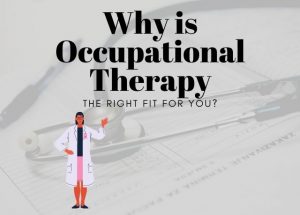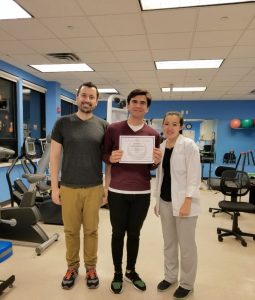When you think of occupational therapy, what comes to mind?
Although occupation is in the name of the profession, our expertise doesn’t involve helping people find employment.
While therapy is found within the title of occupational and physical therapy, we’re not interchangeable. Instead, both professions play their part.
Because this is often confusing, it’s crucial for occupational therapists to educate the public on who we are, what we do, and how occupational therapy can fit in their recovery.
Today, we’ll explore this further. By the end, my aim is to make clear why occupational therapy is possibly right for you. Now, let’s dispel a few myths.
Myth: Occupational therapy only caters to senior members of society
Guess what? This is false. In this profession, we’ll actually work across the broad age spectrum. Specifically, this means that we can help premature babies, teenagers, middle-aged adults, and of course seniors.
Within this area of health care, our aim is to assist individuals who have sensory, cognitive problems, and of course physical ailments. If we observe occupational therapy through this lens, it’s important for us to work with patients across the age range.
Keep in mind, the goal of therapy is to help patients gain independence to the best of their ability. Therefore, we’ll desire this outcome not just for seniors, but it’s equally important for newborns, teenagers, and middle-aged adults as well.
With newborns for instance, we can offer assistance when the child sustains birth defects or injuries. As children progress in age, certain needs and concerns will develop. This can range from developmental delays to chronic illnesses.
With middle-aged adults, we’ll find that individuals are at the tail end of their careers. During this point, certain conditions and work related injuries will become more prevalent. With a customized plan, an occupational therapist can help mitigate the difficult experience.
Ultimately, occupational therapy will provide aid to senior members of society, but our expertise also brings support to the other age groups as well.

Myth: Physical therapists do the same thing
A savory chef and pastry chef perform similar functions, right?
Yes, both members will prepare food for consumption. However, a scone isn’t the same as a chicken entrée, and a grilled duck breast isn’t interchangeable with chocolate cake.
In other words, the idea that both individuals will prepare food will make the professions sound similar. On the other hand though, the type of food items, which they prepare will differ.
Likewise, occupational and physical therapists will seek to improve a patient’s life. However, their expertise falls into two different categories.
In regard to the concept of therapy, both disciplines will offer healing assistance to patients, but their objective will differ.
Physical therapists aim to treat a patient’s specific impairment from a biomechanical position. To accomplish this objective, physical therapists will focus on body movements as well as physical function.
With occupational therapists however, we seek to help each patient function as independent as possible within their environment. With successful treatment, the end result is one that helps patients conduct the following: daily activities with independence.
What makes occupational therapy so vital is that until your life experiences a debilitating hurdle, it’s difficult to imagine a normal activity like brushing one’s teeth as being challenging.
On the surface, brushing one’s teeth seems so mundane. However, we’ll often take normal occurrences for granted because it’s routine in our lives. When something interrupts this routine though, that’s usually the moment we’ll recognize the value of mundane activities.
Myth: Occupational therapists have limited experience with children
Similar to the claim that occupational therapists only cater to seniors, the other assertion is that if the profession does work with children, knowledge with the age group is limited.
In reality, therapy is incredibly useful and well versed on improving the well-being of children. For example, whenever a child experiences developmental delays, the likelihood is that the child will require support throughout different stages of their lives.
In elementary school for instance, a child with autism will require certain attention. Once this child transitions to junior high and high school, the child’s needs will begin to change. Guess what?
When this child makes another life transition such as entering college, different sets of needs will arise as well.
With careful observation of children in their natural setting, this helps us work more effectively with educators and parents alike. By doing so, we can create a customized approach best suited for the child in question.
Similarly, occupational therapy offers the same level of commitment for children with cerebral palsy. Through therapy, the aim is to assist with muscle and joint coordination issues.
When we include therapy for children with cerebral palsy, treatment can help improve cognitive abilities, fine motor skills, posture, and social as well as physical abilities.
Whether therapy is with a child on the spectrum, a child with cerebral palsy, or a child with Down’s Syndrome, our aim is to offer the best quality of care.
As you see, occupational therapists have the expertise to understand the different stages of development. In particular, this plays a valuable role when we’re engaging with various disorders, and this becomes important as children transition from one stage of life to the next.
As an occupational therapist, I assess the world in terms of what daily tasks people can and cannot do. If there’s something that creates limited mobility for example, I must come up with a course of action to increase your mobility, specifically lessen your pain.
Since each person will have different needs, the profession will not ask you to adjust to occupational therapy. Instead, a customized therapy is crafted specifically to meet your needs.
Within this field of health care, we cater to patients hindered by arthritis, Alzheimer’s disease, poor balance, diabetes, spinal cord injuries, stroke, fractures, tendon repairs, ligament damage, behavioral issues, joint replacement, birth defects, ADHD, and that’s just scratching the surface.
Although I can bust countless other myths, the takeaway is that I’m here to help you return to this: your daily activities as independently as possible.
At Occupational Therapy Concept, You’re Family. For a Free consultation, give me a
call at (718) 285-0884 for further evaluation and customized help.



